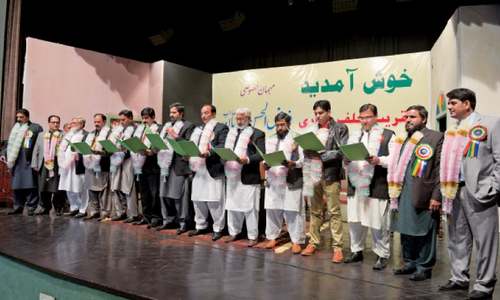QUETTA: It’s the month of December and the chowkidar of Mehraj Town is burning wood in a stove on a road. There is silence all around him. A few minutes later, a pack of stray dogs starts howling.
Quetta’s mountains are blanketed with snow. It’s 4:30am and I try to keep myself warm while I wait for newspaper delivery man Rafique Baloch. He arrives shortly to pick me up from Mehraj Town, to begin with him his delivery route.
Situated in the northwest side of Quetta city, Mehraj Town, with a population estimated to be in thousands, is an extension of the well-known and posh Jinnah Town. It is inhabited predominantly by middle-class families. The distance between Mehraj Town and the Akhbar (newspaper) Market is short. We reach our destination on Rafique’s motorbike in 20 minutes. Other than two police mobiles and stray dogs which we encounter en route to the Akhbar Market, there is stillness on the roads. In the words of Rafique, “the whole city sleeps around this time, except us”.
Hawkers often have to run after customers to clear their dues
Akhbar Market is situated on Adalat Road where vehicles are bringing newspapers to the market, their headlights bringing in illumination. I sit with Rafique inside the market watching him briskly fold and arrange newspapers for his customers. At around 6am, we leave for Nawa Killi to distribute newspapers at people’s homes.
Nawa Killi is tucked into the northern side of Quetta, housing the rich and poor together. With a population estimated to be in several hundred thousands, there are just seven delivery men in the town. Rafique says he and other delivery men deliver around 700 newspapers in Nawa Killi daily.
At the first light of that Friday morning, the weather turns colder, and we begin to deliver newspapers to the residences of customers living in Nawa Killi. “Whether it rains or snows, we have to deliver the newspapers,” Rafique tells me as he presses and throws a newspaper expertly into a house. “There is no holiday in our profession. We deliver newspapers even on Eid days.”
Sleep like a baby
When it’s time for customers to pay up, newspaper delivery men say they are never compensated on time. As we wait in front of a mammoth house, Rafique presses the doorbell for around 10 minutes. No one comes as we stand outside in the cold weather. According to Rafique, it takes delivery men several days to get their dues cleared. This is why he will return in the evening to ask the family to clear his bill.
On the day I am delivering newspapers with Rafique, he is wearing a long coat with a chador wrapped around his head, over his cap. With a bushy long beard and a Roman nose, there is always a smile on his face. Rafique regularly reads Urdu newspapers, including columns. This is why he is always well-informed, he says.
A father of eight, Rafique recently re-married after the death of his wife. In his 50s, he hails from the impoverished Killi Shabo area in Quetta and has been delivering newspapers since 1988. “Throughout the 1990s and the 2000s, people used to read newspapers a lot,” he recalls as he negotiates a turn in the tangled streets. “It is now that people are not bothering to read newspapers and so kiosks selling newspapers are closing down. People have become busy, unnecessarily.”
The population of Quetta city has increased manifold. Other than refugees, people from interior parts of Balochistan have moved to the city for better economic, educational and job opportunities. According to a recent unofficial census, the population of Quetta stands at 2.7 million. “In my rough estimate, 2.7 million people of Quetta read around 18,000 newspapers a day,” Rafique says while talking about the dwindling business of the print industry. “The number is going to decrease in the near future,” he says.
Feeling hopeless for his future as a newspaper hawker, he returns to the mammoth house in Nawa Killi in the evening to get his dues cleared. This time he is in luck. A child opens the gate. Rafique hands the monthly bill to the child, but he comes out and says, “Sahib is not at home.” Rafique goes back home to sleep early so that he can rise tomorrow again at 4:30am.
In his line of work, Rafique says he likes only one thing. He gets to sleep like a baby when he returns home after delivering newspapers.
Published in Dawn, December 30th, 2019












































